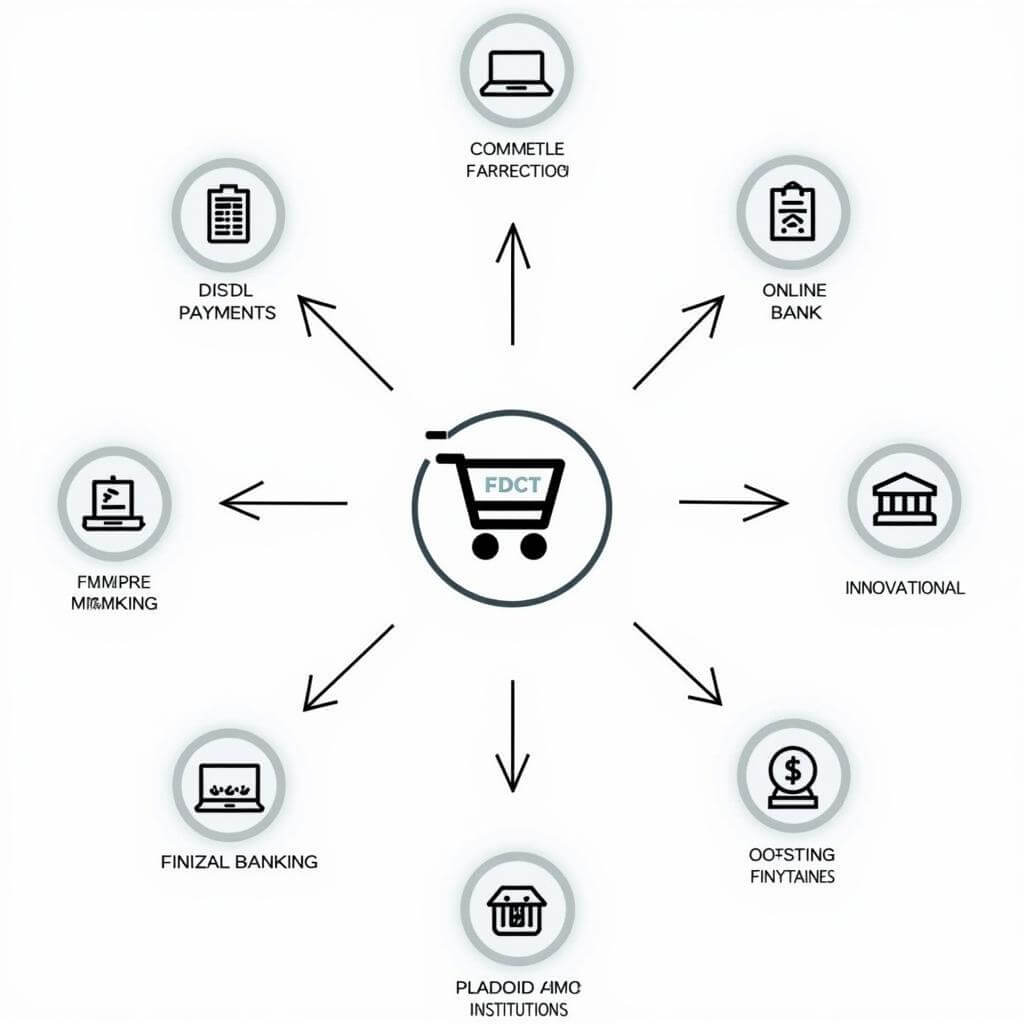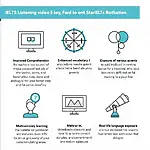E-commerce growth and its effects on financial markets is a highly relevant topic for IELTS Writing Task 2. This subject has appeared in various forms in past exams and is likely to continue being featured due to its global economic significance. Let’s examine a specific question related to this theme and provide sample essays for different band scores.
Some people believe that the growth of e-commerce will eventually lead to the end of traditional financial institutions like banks. To what extent do you agree or disagree with this statement?
Analyzing the Question
This question asks for your opinion on whether the rise of e-commerce will eventually cause traditional banks to become obsolete. It’s crucial to:
- Clearly state your position
- Provide reasons and examples to support your view
- Consider counterarguments
- Conclude by summarizing your main points
Now, let’s look at sample essays for different band scores.
Sample Essay 1 (Band 8-9)
The rapid expansion of e-commerce has undoubtedly transformed the global financial landscape, leading some to predict the demise of traditional banking institutions. While I acknowledge the significant impact of online retail on financial services, I disagree with the notion that it will completely replace conventional banks.
Firstly, e-commerce has indeed revolutionized payment systems and financial transactions. Online platforms like PayPal and Stripe have simplified cross-border payments, while cryptocurrencies offer alternatives to fiat currencies. These innovations have certainly challenged traditional banking models and forced them to adapt. However, this adaptation, rather than signaling the end of banks, demonstrates their resilience and capacity for evolution.
Moreover, traditional banks possess several key advantages that e-commerce platforms struggle to replicate. Their long-established reputations, extensive physical infrastructure, and deep understanding of complex financial regulations give them a unique position in the market. Banks also offer a wide range of services beyond simple transactions, such as mortgages, business loans, and wealth management, which require expertise and personalized attention that online platforms often lack.
On the other hand, it is undeniable that e-commerce has significantly disrupted the banking sector. The convenience and speed of online transactions have set new customer expectations, forcing banks to invest heavily in digital transformation. Fintech startups have also emerged as formidable competitors, offering innovative solutions in areas like peer-to-peer lending and robo-advisory services.
However, rather than spelling the end of traditional banks, these challenges are more likely to result in a hybrid model. We are already witnessing collaborations between established banks and fintech companies, combining the strengths of both to create more efficient and customer-centric financial services. This synergy suggests a future where traditional and digital financial services coexist and complement each other.
In conclusion, while e-commerce has undoubtedly reshaped the financial landscape, it is unlikely to completely replace traditional banks. Instead, we are more likely to see a continued evolution of the banking sector, integrating digital innovations while maintaining the core strengths of established financial institutions. The future of finance lies not in the dominance of one model over another, but in the synergistic combination of traditional expertise and technological innovation.
(Word count: 345)
The effects of economic globalization on local businesses
Sample Essay 2 (Band 6-7)
The growth of e-commerce has changed many things in our lives, including how we handle money. Some people think this will lead to the end of traditional banks, but I disagree with this idea.
E-commerce has definitely made financial transactions easier and faster. We can now buy things online and pay with just a few clicks. This has created new ways of handling money, like digital wallets and online payment systems. These new methods are convenient and have become very popular, especially among young people.
However, traditional banks still have important roles that e-commerce can’t replace. Banks offer services like loans, savings accounts, and financial advice that are still necessary for many people and businesses. They also have physical branches where people can go for help or to discuss complex financial matters. This personal touch is something that online platforms can’t easily provide.
It’s true that e-commerce has forced banks to change. Many banks now offer online and mobile banking services to keep up with customer demands. They have had to invest in new technology and improve their digital services. This shows that banks are adapting to the new digital world, not disappearing.
On the other hand, e-commerce has created some challenges for traditional banks. Online-only banks and financial technology companies are now competing with traditional banks. These new companies often have lower fees and more innovative services, which can be attractive to customers.
In conclusion, while e-commerce has greatly impacted the financial world, I don’t think it will completely replace traditional banks. Instead, we are likely to see a mix of traditional and new financial services in the future. Banks will continue to adapt and work alongside e-commerce platforms to meet the changing needs of customers.
(Word count: 276)
how globalization is affecting local economies
Sample Essay 3 (Band 5-6)
E-commerce is changing how we buy things and use money. Some people think it will make banks not important anymore. I don’t agree with this idea completely.
E-commerce makes buying things online very easy. We can pay for things quickly on the internet. This is good for many people. It’s fast and we don’t need to go to a bank.
But banks are still important. They give us loans for big things like houses. They also keep our money safe. Many people still like to talk to a real person about their money. Banks have people we can talk to.
E-commerce has made banks change. Now banks have websites and apps. We can check our money on our phones. This shows that banks are trying to be modern.
But e-commerce does make some problems for banks. New online companies are doing some things banks do. These companies might be cheaper or easier to use.
In the end, I think e-commerce will not make banks go away. Banks will change and use more technology. We will probably have both e-commerce and banks in the future.
(Word count: 173)
Explanation of Band Scores
Band 8-9 Essay:
- Task Response: Fully addresses all parts of the task with a clear position throughout.
- Coherence and Cohesion: Logically organized with clear progression and effective use of cohesive devices.
- Lexical Resource: Wide range of vocabulary used with flexibility and precision.
- Grammatical Range and Accuracy: Wide range of structures with full flexibility and accuracy.
Band 6-7 Essay:
- Task Response: Addresses all parts of the task, though some parts may be more fully covered than others.
- Coherence and Cohesion: Information and ideas are generally arranged coherently, with some use of cohesive devices.
- Lexical Resource: Sufficient range of vocabulary for the task, with some less common items used.
- Grammatical Range and Accuracy: Mix of simple and complex sentence forms, with some errors that do not impede communication.
Band 5-6 Essay:
- Task Response: Addresses the task only partially, with a simple position presented.
- Coherence and Cohesion: Information and ideas are arranged in a basic structure, with limited use of cohesive devices.
- Lexical Resource: Limited range of vocabulary, adequate for basic communication.
- Grammatical Range and Accuracy: Limited range of structures with frequent errors, though meaning is generally clear.
Key Vocabulary to Remember
- E-commerce (noun) /ˈiːˌkɒmɜːs/ – commercial transactions conducted electronically on the internet
- Financial institutions (noun phrase) /faɪˈnænʃəl ˌɪnstɪˈtjuːʃənz/ – organizations that deal with monetary transactions, e.g., banks, credit unions
- Obsolete (adjective) /ˈɒbsəliːt/ – no longer in use or no longer useful
- Disrupt (verb) /dɪsˈrʌpt/ – to interrupt an event, activity, or process by causing a disturbance or problem
- Fintech (noun) /ˈfɪntek/ – computer programs and other technology used to support or enable banking and financial services
- Cryptocurrency (noun) /ˈkrɪptəʊˌkʌrənsi/ – a digital currency in which transactions are verified and records maintained by a decentralized system
- Digital wallet (noun phrase) /ˈdɪdʒɪtl ˈwɒlɪt/ – an electronic device or online service that allows an individual to make electronic transactions
- Peer-to-peer lending (noun phrase) /pɪə tuː pɪə ˈlendɪŋ/ – the practice of lending money to individuals or businesses through online services that match lenders with borrowers
- Robo-advisory (noun) /ˈrəʊbəʊ ədˈvaɪzəri/ – digital platforms that provide automated, algorithm-driven financial planning services with little to no human supervision
- Synergy (noun) /ˈsɪnədʒi/ – the interaction or cooperation of two or more organizations, substances, or other agents to produce a combined effect greater than the sum of their separate effects
 E-commerce impact on financial markets illustrated diagram
E-commerce impact on financial markets illustrated diagram
In conclusion, the impact of e-commerce on financial markets is a complex and evolving topic that is likely to remain relevant in IELTS Writing Task 2. While the sample essays provided offer a starting point, it’s crucial to practice writing your own responses to similar questions. Consider topics like the role of cryptocurrency in international trade, the impact of mobile banking on financial inclusion, or the challenges of regulating global e-commerce. We encourage you to write your own essay on this topic and share it in the comments section for feedback and discussion.


